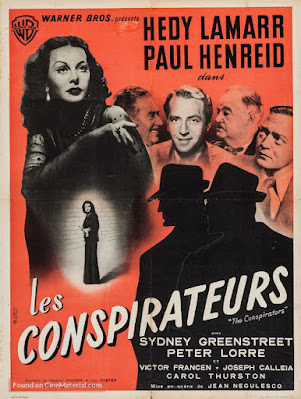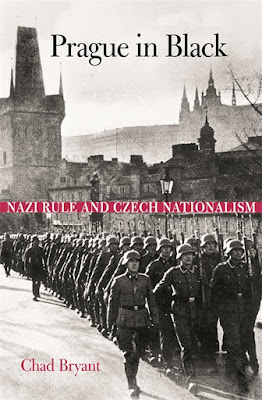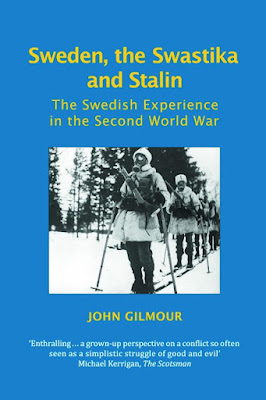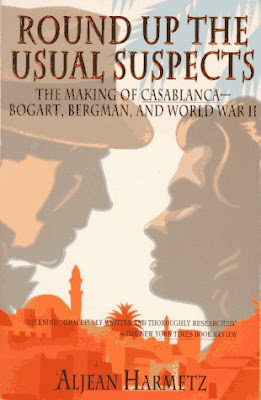For the last six or seven weeks, I've been researching my next novel. I have not been quiet about the paths I've taken; on Twitter and Facebook I've been complaining, screenshotting paragraphs from books, and posting brief reviews of movies. I've also written about a few things I've learned. The actual book I'm writing isn't much of a secret among my writer friends, but I will be unspecific in this post.
What I can be specific about is the time and place: Europe in the 1930s and 1940s. Sweden, North Africa, London, and a bit of Lisbon and the former Czechoslovakia. This means I needed to learn a basic outline of events in World War II - more than I learned in high school, anyway - and, in much more detail, what daily life was like. What people wore, ate, read, listened to, talked about, did in those regions during those years. Were there refrigerators? Cars? Deodorant? Fashion magazines? The war impacts all this, of course, but even establishing a baseline for daily life, before any crisis began, was a challenge.
(In this post, I am going to use not-the-obvious terms for the German government during the mid-twentieth century, for search engine reasons. I'm not denying or soft-pedaling anything; I am not a supporter of that government or its ideals!!!; I just don't want certain audiences who Google horrible shit for the wrong reasons to find this post.)
This was the toughest one (soooooo drrryyyyyy), and possibly the most useful. It taught me the broad outlines of the war's progression and to expect huge differences between the nations in attitudes toward the war. That has served me well. For Sweden, the safety of the people was absolutely paramount, way above worry about how history would judge the leaders' actions, shows of strength, or sticking to a particular moral certainty. That priority was hard for me to get my head around. It was good I started there, though, because this book
was even more challenging (although in its particulars, a very good read). For France, national culture was paramount, above concern about how its populace would cope, and far, far above historical judgment. America's culture is so exportable and reproducible that it took a lot of squinting to figure this out as a priority. Also notable in France was how easily the elderly leaders capitulated, how their concessions and waiting-and-seeing contradicted what younger people wanted and believed (whether they were resistance-minded or not). I think these men, many of whom served in the prior war, believed this would pass, that the German threat simply was not worth digging trenches and making shells, again. Their nearness to sunset likely had a lot to do with this perspective. Food for thought in 2022 America.
This book was helpful for a bunch of reasons, but it was also fun to read because it was full of Jack Warner stories. For those who don't know, Jack Warner, who held absolute power at Warner Bros. for nearly half a century, is legendary for his monstrousness. He was a greedy, single-minded tyrant - but an unbiased one, treating everyone on earth equally terribly. Plus, he was almost always right, which makes him a prime-cut Hollywood monster. I also learned a handful of surprising (and sad) facts about refugees in Hollywood in the 1940s. The author kept returning to the differences in American film production between the 1940s and the 1990s (when the book was written), which I found bitter and needless.
I was surprised at this book, which is self-published history, but was smoothly and tensely written, carefully researched, and fascinating in its own right even though it's about the author's parents. It gave me good information about Stockholm during the war. Self-published history is like Vogon poetry in reputation, but this is a strong book that I'd acquire if I were the editor of a history imprint. Which I never, ever will be.
In my late teens and early 20s I was a Steinbeck fiend, and I'm pretty sure I read this book during that time and retained none of it. The reread was a pleasure. It's a beautiful piece of work, if a little sketchy (in the literary sense). Fun fact: even though it was written deliberately as propaganda, the Allies didn't like it for that purpose, because it "humanized" the enemy. Citizens of occupied nations, however, loved it, and took guerilla publishing measures to get it into as many hands as possible. They knew, because they lived under occupation, that a cartoon enemy is neither accurate nor helpful.
(To be clear: what Steinbeck does in this book is one hundred percent different than what the New York Times has done with its humanizing bullshit. Steinbeck won a Nobel, and the NYT is bothsidesing itself directly into sympathy with the devil.)
I'm nearly out of books I should read and it's almost time to write, so while I wait for a couple of interlibrary loans, I've switched to movies, in the hope that some of them will have reasonably accurate period details.
This one is off to the side a bit in some ways, but the moral philosophy underlying it is right within my concerns. It's got some memorable scenes and situations, but it's a little tedious; Skarsgård is at full power, but Keitel is flashing a LOW BATT light. It also tugs at a thread I noticed across my reading: the punishment meted out to anyone affiliated with the former German government after 1945 was extremely inconsistent, from country to country and from person to person. Frenchmen who wrote occasional pandering articles were shot right away; Germans who did cruel, racist things to fellow human beings walked free. So it went in all nations touched by the war. It's an impossible task, of course, trying to figure out who deserves what. None of us is God.
These two were frustrating but helpful. (Both star Jesper Christensen, a Dane of great renown, but this is sheer coincidence.) The one is about the King of Norway's actions when Germans invaded in the spring of 1940, and the other is about a famous Swedish journalist who publicly, bitchily denounced the German regime from 1933-1945. The King's Choice was shot in all handheld, which annoyed me to no end, yet the acting, the personal dilemmas, and the period details were tremendous. It was clearly influenced by Downfall, but the story didn't propel itself as urgently as Downfall's did. Not a waste of time, but not as good as it thought it was.
The Last Sentence had Bergman intentions and Dreyer austerity, but without the brilliance or flawed human core of either. Also, the DP did not understand how to make a black and white movie vs. a color movie with a black and white filter. But the content had direct bearing on the book I'm writing, more than any other save the one below, so I'm glad I watched it.
So far this is the only movie for research I can recommend without an asterisk (i.e. "if you're interested in Sweden during WWII" or similar). It was stunning, and for an American audience, it's a very unusual story. It did have major elision problems, but I credit the filmmaker for attacking them with sheer will rather than logical writing. Also, the last third of it took place in the very city/decade where a large portion of my book is set, so yay for that.
Here are some other books and movies on my list:
 |
| not great |
 |
| nicer to read than expected but that only goes so far |
 |
| totally awesome |
 |
| sentimental, propagandistic hogwash that I enjoyed a great deal |
This six or seven weeks has been quite a journey for me. I did not know I'd find World War II so fascinating, but I really, really do, in a way that will remind you of your dad or granddad if you ever set me talking about it. It seems from a distance as if it was a simple war, with binary choices and obviously divined motives, but it's not that at all; the middle ground has been far more populous than I expected. Plus I've learned so many amazing one-off facts. Like, for instance, the reason the Blitz on London was halted? Because it didn't work. The intention was to destroy the RAF, various manufacturing hotspots, and the morale of the people. It accomplished none of these things. The RAF turned out to be more skilled, with more maneuverable planes, than expected; manufacturing merely spread out to other parts of the country instead of remaining centralized and thus easily bombable; and, apparently, nothing can destroy the morale of the British people. I find that completely amazing.
I've also learned that the "neutral" powers made a lot of collaborationist compromises; the dictator of Portugal was...kind of...unobjectionable? as a dictator?; Ingrid Bergman was a workaholic; Coco Chanel was a spy for the wrong side; and Czechoslovakia was horribly wronged, but it gave almost as good as it got in the end. And lots more.
I hope I won't have to make another report like this, and that I can just write the damned book instead. But there's still a book on fashion, a book on interwar Britain, a book of Swedish statistics, and a giant book of James Agee reviews (570 pp) containing only one of use to me, all of which are either in my office or headed my way. So...we'll see whether I get this thing going for real by September, or not.









1 comment:
I haven't had occasion to do research like this, but fact-checking is my favorite part of Punch editing. Had a piece on some obscure ingredient recently that referenced World War II in Indonesia. Down the rabbit hole I went, for more than a few hours of Wait, what?!
Post a Comment